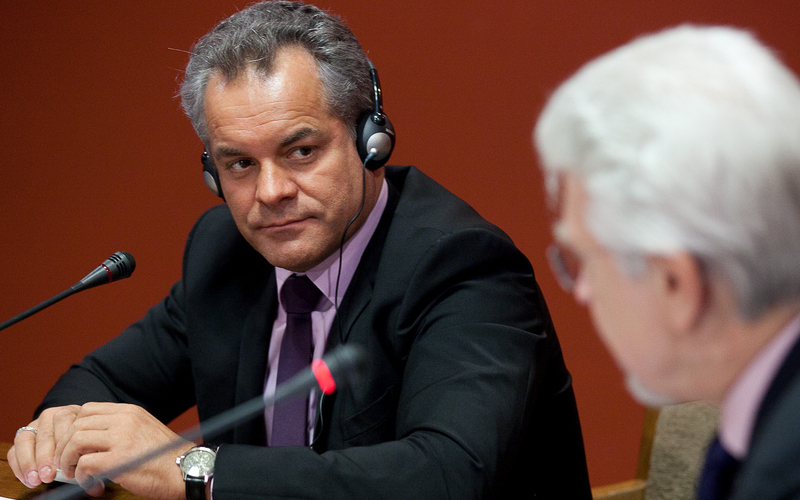
The Master and Moldova
Moldova has become a ‘captured state.’ Its essential organs, including the parliament, judiciary, the law enforcement system; and core parts of its civil administration now operate at the behest of private interests, on a scale remarkable even for Eastern Europe.
Moldova is one of Europe’s smallest countries squeezed between Romania and Ukraine. For a small country of some 3.5 million people, and an economy where the GDP barely passes $8 billion, it has a complex history.
The people of Moldova fear one thing above all: that it could descend into the chaos of their next-door neighbour, Ukraine. There is an underlying concern that if Moldova has its own ‘Maidan Revolution,’ it would fracture the country further; perhaps even into civil conflict.
London’s Royal Institute of International Affairs (usually known as Chatham House) recently held a closed seminar for its members: “Moldova: the Captured State on Europe’s Edge.” So, who has captured Moldova? An Oligarchy, or rather, one oligarch: Vladimir Plahotniuc.
Vladimir Plahotniuc has been alleged to be the mastermind behind a massive Moldovan bank fraud in 2014 involving over $1 billion (12% of Moldova’s GDP) that nearly bankrupted this small country. One of Plahotniuc’s most determined critics has been Moldovan human rights lawyer, Ana Ursachi. She now lives in hiding, having faced an onslaught of prosecutorial pressure in Moldova because of the cases she has brought on behalf of Plahotniuc’s political and business opponents and there are many.
The petite advocate says: “In 2010, after the so called ‘pro-European’ forces came to the government, the core state institutions were apportioned amongst the political parties. The judiciary, Prosecutor General’s Office and National Anticorruption Centre were put under the exclusive control of the Democratic Party, whose master was and still is Vladimir Plahotniuc.”
Ursachi continues: “Plahotniuc uses the state’s coercive institutions to persecute his opponents – either in politics or who have businesses he wants – by means of fabricated criminal cases. For years, Plahotniuc, who wields unlimited power and unlawful influence over Moldova’s state institutions, has subjected many people to politically driven reprisals…Most of them had become my clients, so now he punishes me.”
Ana Ursachi has garnered the support of a long list of European human rights NGOs and members of the European Parliament (MEPs), drawn from across Europe’s member states and political parties. One MEP campaigning for Ursachi is Czech MEP, Jaromir Štětina, who has written to many European groups that Mr. Plahotniuc has launched a lynching campaign against Mrs. Ursachi.
More and more Western European political forces are criticising Plahotniuc in ever more strident terms. In February, 22 European Parliament members signed a written declaration concerning “the involvement of tycoon Plahotniuc in money laundering and illegal financial operations” and “serious dysfunctions of the Prosecutor’s Office and other law enforcement institutions.”
Plahotniuc was an ally of Prime Minister (2009-2013), Vlad Filat, in the Alliance for European Integration coalition that took power in Moldova after the 2009 parliamentary elections. However, while Filat and Plahotniuc, appeared to be allies in the coalition that kept them in power, in reality they were business and political rivals, in a constant struggle to expand their political influence.
Filat’s party hired DC political operatives, Greenberg Quinlan Rosner Research (‘GQRR’) to support their 2014 election campaign. Documents leaked by Moldovan opposition politician and anti-corruption campaigner, Renato Usatîi, reveal contracts to GQRR potentially worth up to $2.5m ahead of the elections. The contracts for GQRR were divided between Filat’s PLDM party and an offshore firm, Rodos Overseas (‘Rodos’) Ltd, a company registered in Belize.
Rodos paid the lion’s share of bills for GQRR’s services to Filat’s political party.
The ‘onshore’ Moldovan contracts for GQRR’s services to PLDM are for less than $14,000 per month. GQRR’s offshore agreement with Rodos is for nearly $258,000 a month: amounts never declared to Moldova’s Central Election Commission which polices the amounts Moldovan political parties can spend on elections.
It is illegal under Moldovan law for foreign individuals or entities to give financial support to political parties. Therefore the payments to Greenberg by Belize’s Rodos for services to benefit Filat’s party were in breach of Moldovan law. Leaked documents also show that some of GQRR’s fees were paid via a chain of offshore firms, but the funds for some of them were ultimately derived from Banca de Economii Moldova, or BEM, which was linked to Moldova’s $1 billion bank fraud, before it was shut down by the National Bank in October 2015. Filat had a dramatic fall from grace and was literally handcuffed in Moldova’s parliament building, arrested and charged with abuse of office and corruption. He has since been convicted and sentenced to nine years in prison.
Filat says he is the victim of political pressure and is appealing his conviction.
But the problems facing Plahotniuc go further than the financial schemes of his past partner in power. Sitting in a Romanian prison and serving a 21-year sentence for an attempted assassination in Romania, is hitman, Vitalie Proca, a Moldovan. Proca was first sentenced to prison in 2005 for another murder in Moldova but in murky circumstances, Proca was released on grounds of ‘good behaviour’ (after having served just a fraction of his sentence).
From his Romanian jail-cell, Proca says he is the shooter in the (as yet unsolved) 2012 attempted murder, in London, England, of Russian national, German Gorbuntsov.
Gorbuntsov – sometimes known as Russia’s ‘Black Banker’ – miraculously survived six bullets in a gun attack in a London street. Gorbuntsov has successfully thwarted extradition requests made to Britain from Moldova (on money laundering and fraud charges) saying he would be murdered if he was extradited to Moldova.
Proca says, in a recording broadcast on Moldovan TV: “Plahotniuc’s hands are in blood up to the elbows.” Also interviewed in prison, Proca told a film crew that he had been “visited by very influential people from Moldova” who had asked Proca to testify that he had never met Plahotniuc but, instead, should name as the person who commissioned the Gorbuntsov killing, Moldovan opposition politician and sworn enemy of Plahotniuc, Renato Usatîi (a politician who has been investigating Plahotniuc for years). Proca refused. In the broadcast recording he says: “If I will write that I have never met with Plahotniuc, this means I remove my last ace from [my] sleeve.”
Pressure piled on Proca after his wife and brother-in-law were imprisoned by Moldovan authorities. Proca’s mother-in-law – a well-known figure in Moldova and head of the Armenian Diaspora – held a press conference and published recordings revealing that one of Plahotnuik’s lawyers had tried to make a deal with Proca: freedom for Proca’s family members in exchange for Proca’s silence.
But Proca has refused to do a deal (his wife secured her release from prison and now lives in hiding).
Proca is now in active cooperation with Romanian prosecutors and says he has been waiting six months for Scotland Yard detectives, investigating the London shooting, to come to Romania and interview him in prison. He says he will tell Scotland Yard who hired him to kill Gorbuntsov.
Moldovan Communist politician, Alexandr Petkov, spoke on Moldovan TV in December 2016 about how he met with Romanian prosecutors; and how he filmed a man called Valeriu Malarciuc, a friend of Proca’s and a courier for money paid to the hitman. Petkov said “Plahotniuc was in a thundering rage” when he found out that Malarciuc had started to talk.
Petkov continued: “There are cases of selective justice in Moldova. This case is a tragedy for Moldova. I do not mean that Proca is an angel…he has to stay in jail. Some serious things were revealed that clearly show who coordinates everything that happens in [Moldovan] justice.”
Meanwhile Proca still waits for Scotland Yard detectives. If they appear, and what he says is proved to be true, it might yet begin a political earthquake in Moldova; bringing down even the most powerful.

